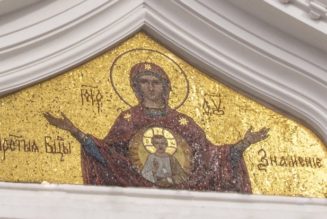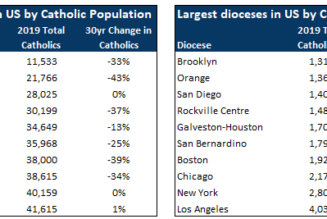
Offering something hopeful, at Lent
Typically, when you walk into a Catholic church, there is a font for holy water, water that has been blessed. It’s what’s known as a sacramental, a sacred sign meant to remind us of baptism. But one recent weekday, I dipped my hand into a familiar font in a prominent church in our nation’s capital before morning Mass and encountered it empty. Caffeine-less, I was confused. We do this closer to Good Friday, but we are not there yet. It was only later, when the sign of peace was skipped during Mass, that I realized: coronavirus!
I once saw a man wash his feet in the holy-water font of a church in Center City, Philadelphia (which was, among other things, quite the feat), and while I hope that isn’t common, I can not only understand, but endorse the withdrawal of holy water. And as for the sign of peace, coming as it always does at the most solemn time of the Mass, I’m fine keeping in some silence with the Lord in prayer. That said, it does make me uneasy, as we all seem to be. And that’s not quite right. As we take necessary precautions — I’ve been watching the Facebook chronicles of a college professor in Rhode Island I know, and of her teenager in quarantine for possible exposure (the whole family is as a precaution) — there is also a real fear in the air.
What bothers me about the empty holy water-fonts is not the empty holy-water fonts per se. What seems off is that the response of Christians and all religious believers has to look different from that of the secular culture. I daresay that the wider world needs us to have a different approach. When people are reading headlines and hearing news stories about closed churches and canceled Masses in Europe, that’s not exactly inspiring.
One of my favorite quotes is from Pope Emeritus Benedict, in a letter on hope: “The one who has hope lives differently; the one who hopes has been granted the gift of a new life.” What precedes that passage is this: “The Gospel is not merely a communication of things that can be known — it is one that makes things happen and is life-changing. The dark door of time, of the future, has been thrown open.” That seems appropriate. That seems the beginning of a pep talk here to Christians. And for goodness’ sake, this is Lent, a penitential season when we remember who we are, who we have been made to be. Fine about the handshakes and holy water, but what are we conveying about hope to the world, my fellow religious believers? (To those who do not have faith in God, I apologize for our confused and disappointing witness — here and on many other fronts.)
We Christians are to live to love and serve God through serving others, to die to self and ultimately to be with God for eternity. What does it say if we are just as scared of coronavirus as everyone else is? Again, taking precautions, but shouldn’t we be not as fearful as someone who might not believe with conviction that there is something more after this world? Why are most of us acting as if there’s no such thing as redemptive suffering? That’s no reason to run to coronavirus-infected communities, unless we are doctors or nurses or others who can provide similar help. Still, why is it that with such pits in our stomachs we are watching news stories about the virus’s geographic spread? Is coronavirus exposing our unbelief?
We never know the day or the hour of our death. We confess our sins to be in the state of grace so that we will be more of who we say we are and will be more prepared to meet our Creator when the hour of death comes.
Adrienne von Speyr, a Swiss medical doctor and mystic who died in 1967, seems to have our number here: “Lord, because we take your death so lightly that we rarely even think about it, / the thought of our own death is also strange and distant. / Even when stern messengers forewarn us, / we manage to stifle the thought of our death /and to go on living as if our earthly existence would never end.”
Then she prays: “Let us die as believers / whose faith also shines upon the others / who assist at our death, brings them help now, and perhaps later, / when their own hour comes, gives them consolation.”
I can’t help but think it’s not an accident we’re facing this during Lent. The Latin phrase memento mori — remember, you will die — captures the spirit that seems to be missing in the coronavirus frenzy. It may be coronavirus, or old age, or an accident, but we will die. In this current scare, can we take spiritual precautions on top of all the rules about sneezing and social distancing? Let us not distance ourselves from the Creator we say we believe in, who made us for Himself — always living hope!
This column is based on one available through Andrews McMeel Universal’s Newspaper Enterprise Association.








